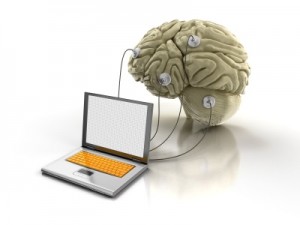Brain Activity Can Predict If People Will Benefit From Cognitive Training
Cognitive performance can be improved but people vary in their ability to do so. It is not clear yet how to assess who will benefit the most from training and the cognitive tests used in the past were not very good at predicting this.
Dr. Kramer and his colleagues recently showed that the brain activity in a specific part of the brain (the dorsal striatum) at the start of training in a complex video-game could accurately predict how well people will benefit from the training. Thirty-four young adults with little experience in playing video games were trained to play a complex video game called Space Fortress. After initial instruction, they played the game while their brains were being scanned using fMRI. For the next three to eight weeks (38 days on average) they completed ten two-hour training sessions playing the game outside the scanner. Finally they underwent a second fMRI scan similar to the first one. The results showed that the patterns of activity in the dorsal striatum recorded before the start of training were highly predictive of the success at learning how to play the video game.
Participants were divided into groups of 2 group: good and poor learners based how much their score improved from the beginning to the end of the training. It was found that the activity in the dorsal striatum was higher for good than for poor learners. The correlation between improvement in score and activity in this brain region was significant.
Good and poor learners not only differ in their level of activity in the dorsal striatum, but also in the activity patterns within this region. This combination of differences allowed the researchers to predict which subjects will be good learners just by looking at their brain activity before the training began. The dorsal striatum is involved in learning and execution of complex responses: It plays a role in habit learning and in carrying out or initiating complex goal-directed tasks such as task switching.
Why should we care about these results?
Training with the same video game (Space Fortress) has been shown to improve flight control proficiency in novice pilots. Since training can be costly both in terms of money and time, being able to determine before training who would benefit the most from it could lower such costs.
The results matter also for individuals trying to boost specific performance (memory, attention, etc.). Indeed, ideal brain training should be specific to the individual and his or her goals. Having a way to determine if a type of training will benefit the individual would be a great help in deciding which training program to use.
Why would fMRI be more predictive than cognitive performance?
Dr. Kramer speculates that it might be that the structure/function of the brain is closer to the source (and hence possibly measured with less error) of the tissue and processes responsible for learning – than measures of different (relatively isolated) cognitive abilities.
Do you find this fascinating?
Dr. Kramer’s lab has a post-doctoral fellowship you may be interested in: POSTDOCTORAL FELLOWSHIP IN HUMAN BRAIN PLASTICITY, BECKMAN INSTITUTE, UNIVERSITY OF ILLINOIS
Applications are invited for a multi-year fellowship position in human brain plasticity at the Beckman Institute, University of Illinois. The successful applicant will have the opportunity to play an important role in the interdisciplinary study of human brain and cognitive plasticity in several funded research projects including cognitive training in a complex video-game like environments and fitness training with children and adults.
Essential skills include a thorough knowledge of functional MRI and structural MRI techniques, good organizational abilities, as well as the ability to work well in research teams. While this position requires technical sophistication it is more suited for someone who is scientifically interested in neuroplasticity and its relation to cognition, than someone with a strict methods orientation. The successful applicant will hold a PhD; however applications are also welcomed from current PhD students who will have submitted their dissertations by June 1, 2011.Salary will be in the range $44,000 to $50,000, depending on knowledge and experience, and will come with health and other benefits at the University of Illinois.
Please send applications (via e‑mail) including cover letter, CV, the names and addresses of three referees, in one pdf file, to the Principal Investigator, Dr Art Kramer (a‑kramer at illinois.edu), Director of the Beckman Institute. You are also welcome to check out this for more information on the Beckman Institute and the lab.



